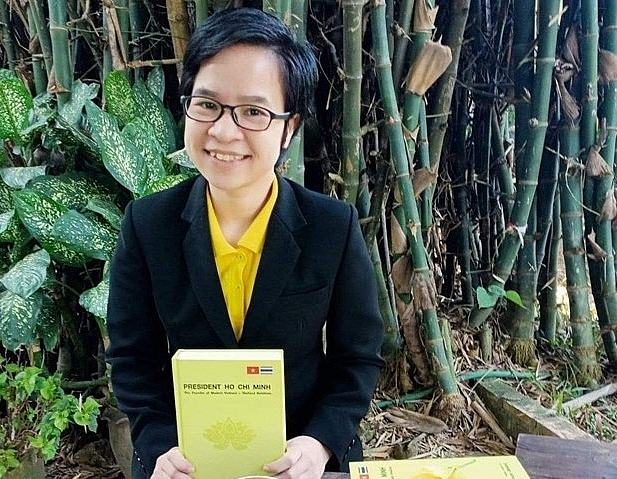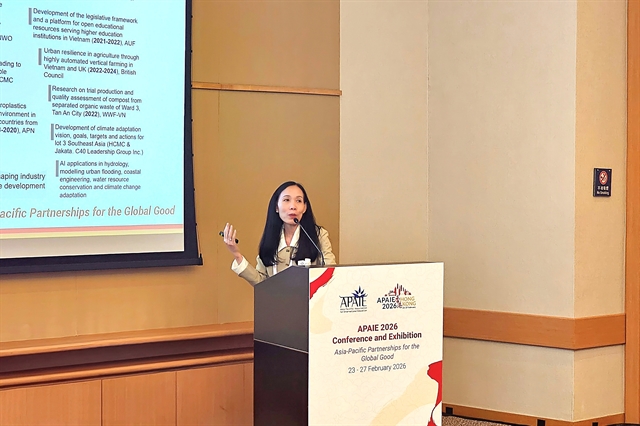 Society
Society

With the desire to convey valuable information about President Hồ Chí Minh's journey to spread patriotism among the overseas Vietnamese community in Thailand, Vietnamese and Thai researchers painstakingly compiled a book written in three languages – Vietnamese, Thai and English.

|
| Overseas Vietnamese Assistant Professor Dr Trương Thị Hằng and her book “President Hồ Chí Minh, the Founder of Modern Vietnam – Thailand Relations”. — VNA/VNS Photo |
HÀ NỘI — With the desire to convey valuable information about President Hồ Chí Minh's journey to spread patriotism among the overseas Vietnamese community in Thailand, Vietnamese and Thai researchers painstakingly compiled a book written in three languages – Vietnamese, Thai and English.
Vietnamese and Thai versions of the book “President Hồ Chí Mính, the Founder of Modern Vietnam – Thailand Relations,” co-authored by Assistant Professor Dr Trương Thị Hằng at Lampang Rajabhat University and Professor Chuan Petkaew at Suratthani Rajabhat University in Thailand, was published in May 2019.
The English version of the five-chapter book by Associate Professor Dr Prachacksha Saisang, former lecturer at Thailand’s Naresuan University was published in celebration of Hồ Chí Minh’s 130th birthday (May 19, 1890 – May 19, 2020).
Sharing about the motivation to write a book about Uncle Hồ's revolutionary activities in Thailand, Hằng said that the life and career of President Hồ Chí Minh was a great journey, not only because of his contributions to the history of the Vietnamese nation but also his mutual love and affection, and spirit of international solidarity.
“His international solidarity is always a shining example for future generations to learn and follow,” she said.
“Living and working in Thailand since 2008, I have researched and collected documents written about the life and career of President Hồ Chí Minh in Thai, in which there is a lot of information that Vietnamese documents have never mentioned,” Hằng said.
“With deep respect and gratitude for the late President's great contributions to the cause of national liberation, I would like to further complete his biography," Hằng said.
This female doctorate, who is currently teaching at Lampang Rajabhat University in Thailand, said that with the book "President Hồ Chí Minh, the Founder of Modern Vietnam – Thailand relations" written in Thai, she expected that Thai readers would have the opportunity to understand more about the spirit of peace-loving, international solidarity and especially the deep affection that President Hồ Chí Minh had for the country and people of Thailand.
Around the beginning of July 1928, President Hồ Chí Minh arrived at Khlong Toei harbour in Bangkok, starting his journey to spread patriotism and build patriotic organisations in the overseas Vietnamese community in Thailand.
Although his time in Thailand was only until the end of 1929, his activities here were especially important for the establishment of a single political party to lead the Vietnamese people's struggle movement.
However, due to the secret operation to avoid the tracking of French secret agents, there were very few documents recording the activities of the late President Hồ Chí Minh in Thailand.
Hằng said that the biggest difficulty in studying the process of President Hồ Chí Minh's activities in Thailand was that there were very few documents written in Vietnamese, Thai or English on this topic. Therefore, in addition to trying to collect, select and carefully study all relevant documents, she also relied on the support of Thai research experts in piecing together single events scattered from different sources to be able to give readers the most general and accurate view of the period when President Hồ Chí Minh was in Thailand.
In addition, limitations and language barriers were also one of the reasons why Vietnamese and Thai scholars faced difficulties in accessing each other's sources, which created many misunderstandings in previous studies, Hằng said.
She added that she and Thai co-author Professor Chuan Petkaew tried very hard to bring Vietnamese and Thai documents to research and cross-checked to get the most objective information.
The two co-authors hoped that the book would create favourable conditions for Thai researchers, lecturers and students to have access to new and accurate sources about the life and career of President Hồ Chí Minh.
Sufficient understanding could help enhance his influence as well as honour the immortal values that President Hồ Chí Minh bestowed upon the Vietnamese people, as well as to progress mankind.
Hằng told Vietnam News Agency in an interview ahead of Hồ Chí Minh’s 132nd birthday that: “Professor Chuan Petkaew once shared that he grew up in an era when regional and world politics had extremely strong changes, especially the process of fighting for and maintaining independence and establishment of countries in Southeast Asia. Ever since he was a teenager, he had heard a lot about President Hồ Chí Minh.”
“Professor Chuan Petkaew greatly admires President Hồ Chí Minh's patriotism and great sacrifice, which in his opinion is rare for any leader in the world,” she added.
In the process of writing the book, Hằng said she received a lot of attention and support from Rajabhat Lampang University's Board of Directors and senior Thai researchers because it was a meaningful research work.
“The work not only helps Thai scholars and people better understand the life and career of the great President Hồ Chí Minh but also helps to strengthen the good relationship between Thailand and Việt Nam at this time,” she said.
Rajabhat Lampang University introduced and gave the book to agencies, organisations and readers in Thailand and Việt Nam in May 2019.
In addition, the university also donated books to the libraries of 100 universities across Thailand so that Thai teachers and students would have additional materials during their research on the biography of President Hồ Chí Minh – one of the world's greatest leaders of the twentieth century.
Regarding future plans, Hằng said that because of few documents written on the biography of President Hồ Chí Minh in Thai and English, many Thai people only knew President Hồ Chí Minh as a political activist, but do not know him as a poet, writer or journalist.
“I hope that in the future I can collaborate with Thai scholars to translate and publish some outstanding poetry collections of President Hồ Chí Minh, for example his prison diary or his spring poems from Vietnamese to Thai,” she said. — VNS




